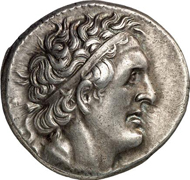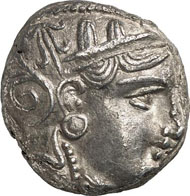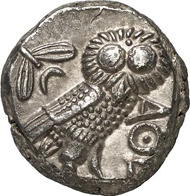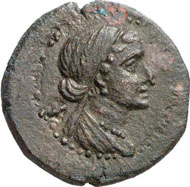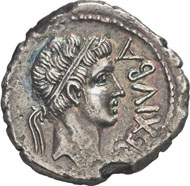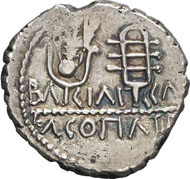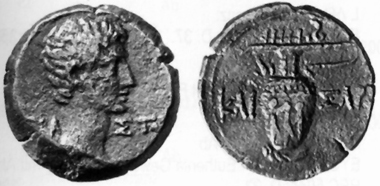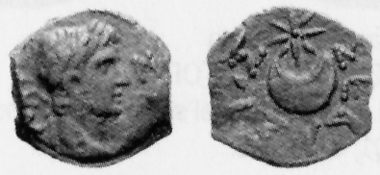Egypt used to be the area with the most refined administration as early as Pharaonic times. There was a regulation for everything, how much taxes who had to pay, which farmer cultivated which fruit on his land, and later – under the Ptolemies – what kind of money was used to pay in the bazaar and at the market.
Satellite view of the Nile River delta. Photograph: NASA / Wikipedia.
At the same time, Egypt was a country where it was easy to monitor foreign dealers entering and leaving the country. Only few ports were located in the marshy Nile River delta where it was easy for a cargo vessel to anchor. In the west and the east, the desert prevented trade caravans from passing through. Thus, everyone aiming at acquiring grain or the precious works of the craftsmen was forced to enter the country through one of its official borders – and that was pretty unique in ancient times.
EGYPT. Ptolemy I, 305-282. Tetradrachm, 295/4-293/2, Alexandria. Weight: 14.16 g. From auction sale Gorny & Mosch, München 165 (2008), 1435.
It enabled the ruler of Egypt not only to monitor entry but also to control the circulation of money. Ptolemy I had been the first to realize what big chance Egypt, this special case, provided to levy a tax without attracting attention. He made his mints struck tetradrachms that were underweight compared with the other tetradrachms that was produced for commercial purposes.
ATHENS. Tetradrachm, 337-294. Weight: 17.09 g. Dewing Coll. 1634. From auction sale Gorny & Mosch, München 165 (2008), 1260.
Anyone who entered his empire was obliged to convert his own coins into Egyptian ones, in a ratio 1:1. That brought the ruler a nice earning, a kind of turnover tax that made the rulers of this country rich for hundreds of years simply because Egypt was the most important country of exportation in the ancient world.
Augustus conquers Egypt
The basic rule was: the one who ruled Egypt was rich. He was not only rich, but so rich that none of the dignified fathers in the Roman senate thought one of their colleagues capable of dealing responsibly with this wealth. That was said to be the reason why the Romans were reluctant to annex the weak empire at the Nile River.
CYPRUS. Cleopatra VII, 50-31. AE, 36/5, Orthosia. RPC 4501. From auction sale Künker, Osnabrück 133 (2007), 8276.
It was Augustus who finally captured Egypt after the Battle of Actium in 31. B. C. After his victory over the Egyptian navy and the troops of Marc Antony, he advanced on Alexandria, marching at the forefront of his soldiers. On 1st August of the following year, he annihilated the last remains of Marc Antony’s forces. The rest is well-known. Egypt was conquered. Marc Antony and Cleopatra committed suicide. Caesarion, biological son of Cesar, was murdered.
NUMIDIA. Juba II, 25 B. C.-A. D. 23 and Cleopatra Selene. Denarius, A. D. 11. From auction sale Künker, Osnabrück 133 (2007), 8295.
Only the three underage children of the Egyptian queen and Marc Antony survived. They were dragged to Rome to deck the triumphal procession there. Cleopatra Selene is the only one whose further whereabouts are known: after the victory parade, she was handed over to Octavia, the sister of Octavian, to be educated, and given as a reward to Juba II, loyal king of Numidia, in 20 B. C.
Augustus, ruler over Egypt 30 B. C.- A. D. 14. AE, no year. Rev. wine jug. Künker 89 (2004), 1731.
After his victory, Octavian was faced with the problem of how to make use of the wealth of Egypt for his own purposes without sharing the control over the vast resources. Technically speaking, the entire Egyptian country had belonged to the Pharao, and so Augustus slipped into this role. He took over the country as part of the Roman Empire, but likewise as his own personal possession at the same time which wasn’t governed by any senator but by a knight he himself had appointed. In addition, he forbade any member of the senatorial order to enter the province of Egypt without special permission. Egypt’s function was to supply the emperors with grain for the future which they needed to make the Roman plebs their clients and to maintain peace in the capital at the Tiber River.
Augustus, ruler over Egypt 30 B. C.- A. D. 14. AE, no year. Rev. crescent and star. MMDe 12 (2003), 454.
In order to achieve that, Alexandria as the administrative center had to be spared. That cost Octavian a pretty penny. Allegedly, he paid every soldier 1,000 sestertii to compensate his army for the lost sack. At the same time, it was important to keep Alexandria under Roman dominion. The people of Alexandria therefore weren’t allowed to have their own administration, contrary to most of the other cities. Octavian took away the central institution, the city council, from the Alexandrinians to the effect that the citizens were deprived of any legal possibility to draw attention to their concerns.
Livia, wife of Augustus. AE, 11/2. Rev. Athena. Heidelberger Münzhandlung 20/I (1997), 146.
It goes without saying that Octavian skimmed off the country’s assembled treasures thanks to confiscations and special taxes. The future Augustus did so that efficiently that he was able to pay his soldiers and to clear all accrued debts in Italy and still had left over an enormous sum. It is said that the interest rate in Rome dropped from 12% to 4% due to the huge influx of capital.
Germanicus in Egypt
Egypt continued to be a well-protected imperial possession. The regulation that no senator was allowed entry into the country was very, very serious. Exactly how serious is illustrated by the case of Nero Claudius Germanicus, adoptive son of Tiberius, who – out of foolishness or of scheming thirst for power – broke the imperial law.
Tiberius, 14-37. Tetradrachm, 20/1. Rev. head of Augustus with radiant crown r. Münzhandlung Basel 6 (1936), 6.
Germanicus was forced to back down at once. Tiberius reprimanded his potential successor so strongly that the latter asked the Egyptians, who were sweet on him, to abstain from further professions of sympathy. Whatever Germanicus’ had in mind when he travelled to Egypt, he couldn’t put into action anymore. Half a year later, he was dead. Rumor had it that he had been poisoned by the governor of Syria.
The Greeks, the Jews and Rome
Alexandria was a cosmopolitan city with its people coming from all over the word. Egyptians, in contrast, were thin on the ground. Most of them lived in the countryside and grew the corn that made the true wealth of the country. Since Alexander had captured Egypt, trade as well as administration lay in the hands of the Greek upper class. Apart from that, it was the very large and extremely rich Jewish community who played a part in the urban life. Although it enjoyed the emperors’ special protection it still wasn’t able to compete with the Greek inhabitants of Alexandria because of the civil right: while the Greek inhabitants of Alexandria – the Alexandrinians as we would like to call them – possessed the civil right that granted them tax breaks as well as protection from encroachments of the Roman justice, the Jews – despite of all their wealth – were treated like the local Egyptians in legal respects.
Agrippa I, 37-44. AE, year 6 (41/42), Jerusalem. Av. sun shade. Rev. three ears of grain. Meshorer, Treasury 120. From Künker eLive auction 19 (2013), 264.
The two demographic groups engaged in conflict again and again, for example during the summer of A. D. 38, when the Jewish king Agrippa I visited the Jewish community. He was welcomed with all the trimmings the rich Jews could get for their money. That caused hard feelings among the Greek fellow citizens. The irritation about all the money wasted erupted into fierce parades caricaturing the Jewish King marching in.
Unfortunately, the Roman governor supported the anti-Semitic movement. Instead of appeasing, he stirred up the conflict. He had a corporal punishment executed with the whip on 38 members of the Jewish council of elders to demonstrate that the members of the Jewish community were on a par with the Egyptians. If it had been a Greek, he would have been punished with the stick ‘only’. The situation escalated when, on 31st January 38, a group of Jews were coerced into eating pork, under threat of capital punishment and in the presence of the governor. Rome’s representative, however, had overrated his power. He was arrested and had to justify himself to the emperor.
Of course, that didn’t cool down emotions. There were continuous excesses on both sides. The emperor tried to find a way for the two parties living together peacefully in Alexandria. Both Jews and Alexandrinians sent an envoy to Rome, with the latter apparently meeting better what Caligula wanted to hear. They pointed out that their enemies neglected “the honors that belonged to Caesar; for that while all who were subject to the Roman empire built altars and temples to Gaius, and in other regards universally received him as they received the gods, these Jews alone thought it a dishonorable thing for them to erect statues in honor of him, as well as to swear by his name.” Hence, the Jews were a tough act to follow, but the assassination of Caligula on 24th January 41 put them out of their miserable situation.
Claudius, 41-54. Tetradrachm, 45/6. Rv. Messalina standing in frontal view. Münzhandlung Basel 6 (1936), 44.
Claudius, his successor, refused to put the blame on either of the two parties in his rescript from 10th November 41. He decreed that peace was to be maintained and no privileges sought one didn’t deserve (that addressed the Jews who claimed the Alexandrinian civil right). Establishing peace between the two conflicting parties, however, was still a long way ahead.
In part II you read about the tensions between Greeks and Jews escalating and prompting violent repercussions.
The other parts of this series you can find here.






